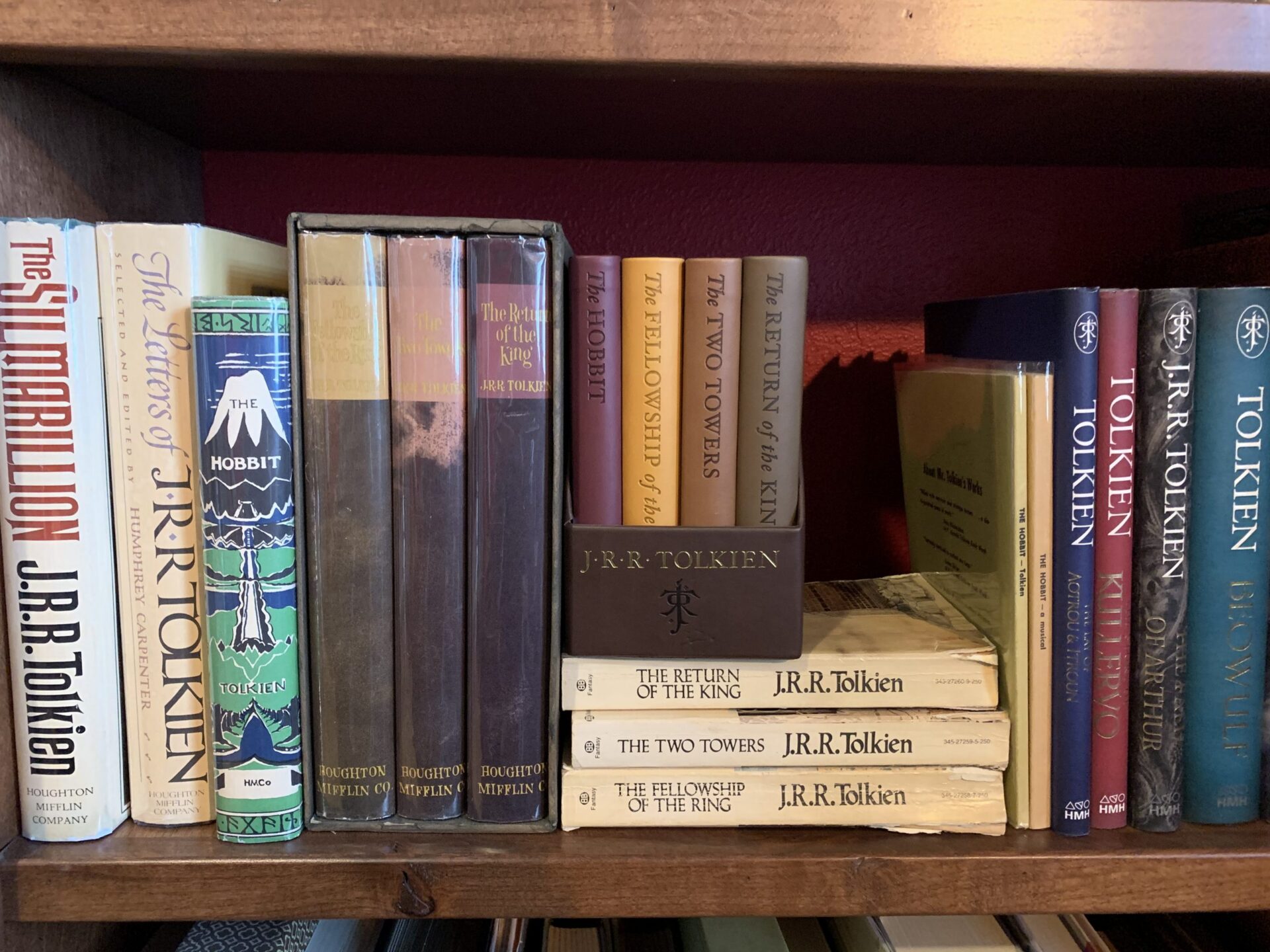The day after Thanksgiving yields a joy of three parts. The first joy is that of an introvert newly restored to peace and quiet after the raucous hubbub of last night’s family dinner. The second is the simple pleasure of pie for breakfast. The third joy is the renewal of my annual re-reading of The Hobbit and The Lord of the Rings.
The pleasures of a good book are manifold. C.S. Lewis declared that there was never a book long enough or cup of tea large enough to suit him. Thomas Jefferson asserted that he could not live without books. Erasmus claimed that whenever he obtained a bit of cash, he would buy books and then buy food and clothes with whatever was left over. These are all positions I endorse and consider more or less true of myself.
Some years ago, while reflecting on the patterns that had emerged in my reading life, I realized that re-reading favorite books was perhaps the keenest pleasure in my book-centric life. At the time, I owned a used bookstore and was in the midst of a reading and blogging project (back when such things were newly trendy). As much as the possession of beautiful books delights my soul, as much as a new story can sweep me away, I love the experience of sinking into the familiar curves and re-entrants of a favorite novel more.
Over time I have developed an ad-hoc annual calendar of re-reading that offers bones to the yearly cycle of voracious consumption of written words. The calendar year starts with Jane Austen’s six novels spread over January and February. Spring is for new books and whatever has caught my fancy; in Summer I revisit theological and devotional works while also delving into whatever scholarship I need to complete for teaching. During the Autumn I enjoy The Chronicles of Narnia, and on the day after Thanksgiving, I start Tolkien’s epic and aim to get to the “Scouring of the Shire” by Christmas Eve.
The Lord of the Rings is the perfect literary accompaniment to Advent and the annual re-reading both disciplines me to not read Tolkien the rest of the year and to deepen my understanding and love through this structured time. My sense of my own humanity and of the growth experienced in times of trial and fasting, as Advent theologically intends, is profoundly enriched by Bilbo’s love of home, the hobbits’ general love of food and drink, Frodo’s yearning for adventure, Sam’s transcendent amicitia, Gandalf’s wisdom-in-uncertainty, Galadriel’s queenly insight, Faramir’s ethical clarity, and Aragorn’s calm self-confidence.
As November wears on, I look at my TBR pile and estimate how far I will get before the day after Thanksgiving. I pull out my three(!) different sets of Tolkien’s epic and try to decide whether I should read the ragged paperbacks, the lovely hardcovers, or my new little leather-bound set this year. And then the day comes and I pull out The Hobbit and my reading soul is shaped and reshaped by the familiar and its renewal:
In a hole in the ground there lived a hobbit. Not a nasty, dirty, wet hole, filled with the ends of worms and an oozy smell, nor yet a dry, bare, sandy hole with nothing in it to sit down on or to eat: it was a hobbit-hole, and that means comfort.
I then I meditate on comfort and hominess and the work, mostly invisible, that goes into the creation of a center for human life. How is it possible that for millennia men and women have poured billions of hours into the mundanity of soup and bread? How is it that human identity is shaped so deeply by the provision of seed cakes or chocolate chip cookies for an afternoon snack? How is it that one can love through the medium of a peanut butter and jelly sandwich? How is it that other people’s perception of me can shape my ambitions so profoundly as Bilbo’s sensitivity to being called a “grocer” drove him to risk his life on a mad adventure? How to discern the mixed good and evil of new opportunities and unexpected talents as in Bilbo’s finding of the ring? What is the truly restful place and how much of it is found in the right balance of song and food and quiet? Is my soul wise enough that it would find Rivendell as delightful as the Elves do? The first one hundred pages of the least of the four books is a life’s work worth of philosophy.
The gift of re-reading is that I can confidently wend my way through the familiar story secure in a tingling awareness of its depth and richness and in the certainty that this year’s reading will yield both a deepening understanding of the wisdom I’ve imbibed before and a new insight into the rich world Tolkien knew. The gift of a planned re-reading is that I do not have to remember that it is good for me to be reminded and renewed in these things. My own limited awareness of my needs is too weak to teach me anew every day: I need this structure that doesn’t have to be tweaked all the time, that doesn’t have to be reconstituted with each change of mood or circumstance. Of course, I do occasionally add a new work to my annual re-reading plan and if I keep it up, I may end up at 85 with a thousand books to get through each year before I can read something new. What a perfect way to spend my last decades.






7 comments
Rob G
I used to read a Thomas Hardy novel, or at least a few of his short stories, every fall, as I’ve always seen him as a very “autumnal” writer. I’ve gotten away from that the last few years but should probably start the habit up again.
As far as the buying of books goes I’ve found that I’ve gotten much more selective as I’ve gotten older. I buy fewer books, but I tend to buy better ones.
Matt Mills
I love the article, thanks. You’ve missed one great quote in your intro though: “Wisdom is not in many books read, but in several good books read often.” – Dr. Martin Luther
Thomas McCullough
It’s a bit of a tangle and a darker, deeper read, but I put The Silmarillion, Unfinished Tales and The Children of Huron meshed into a continuous narrative for a read which I find as edifying as The Hobbit and LOTR. More so, really, for me.I
Further, Leaf By Niggle is the greatest work of religious literature of the twentieth century. Off topic, but I wanted to write that.
Matt W
Thanks for this article. A friend of mine once told me that every winter he re-reads LOTR and I thought it was an interesting idea. I’m glad to hear of another doing that as well. The editors of the British Library Crime Classics (stylish paperback reprints of early 20th century detective fiction) put out winter-themed and Christmas-themed short story collections which I like after Thanksgiving. However there is less of a liturgical connection with crime fiction compared with Tolkien.
Russell Arben Fox
Last year, the fact that our youngest daughter had just completed her first reading of LOTR made me realize that I hadn’t read the entire series through in years, and I sat down to do so, from Christmas until New Years. It was such a marvelous re-introduction to ways of thinking about the world that had been crucial to my own development for so long! You sentence here–“The gift of a planned re-reading is that I do not have to remember that it is good for me to be reminded and renewed in these things”–captures it well. I hadn’t thought of my return to Tolkien as serving a “liturgical” purpose before, but now I see the truth of it. When it comes to scripture, I already do something similar, but to expand that to these other classics? What a brilliant thought! Thanks for sharing these observations.
Brian D. Miller
I always feel guilty for rereading favorite books, not anymore!
Bob Buhr
Lovely piece–thank you.
Comments are closed.